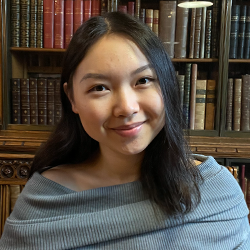
The Engineers Canada Leadership Scholarship consists of eight scholarships of $4,000 each annually to provide financial assistance to undergraduate students in CEAB-accredited engineering programs. These scholarships are awarded to undergraduate engineering students returning in the fall who have completed one year of engineering studies and who demonstrate potential to be leaders in advancing engineering in Canada.
Meet the 2024 recipients of the Engineers Canada - Leadership Scholarship
- Jolie Gan
- Konrad Jasman
- Brian MacDonald
- Jayden Mackenzie
- Alexis Paredes
- Farah Sadek
- Joyce Xi
- Ruth Yu
Jolie Gan

Bachelor of Software Engineering
University of Toronto
Jolie Gan is pursuing a degree in software engineering with a focus on cybersecurity to leverage technology as a tool for social justice and empowerment. More specifically, Gan wants to address issues of domestic violence in rural and Indigenous communities where there is a lack of adequate cybersecurity infrastructure hindering the efficient routing and location of victims by local authorities.
Jolie is acquiring this knowledge through her leadership within the engineering community as Chapter President at the Institute of Electrical and Electronics Engineers (IEEE) Student Branch, overseeing the Software Engineering Chapter and a National Youth Advisor for the RCMP National Youth Advisory Council, contributing extensively to governmental infrastructure projects across four countries. For Jolie, computers offer a means of agency and escape for victims and the potential to hold perpetrators accountable. There is and remains a large gap in security, gender equality, and safety that Jolie wants to contribute to through engineering.
Konrad Jasman
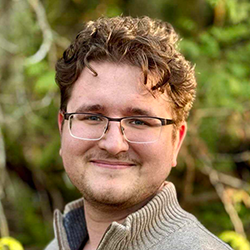
Bachelor of Software Engineering
University of Victoria
Konrad Jasman significantly expanded a university student club in the first year of his leadership. In 2021, Konrad became Vice-Chair of the University of Victoria’s Institute of Electrical and Electronics Engineers Student Branch. The group began with less than 10 members and grew to 140 In Konrad’s third term. In recognition of these achievements, their student branch was awarded the “Exemplary Student Branch” award in 2023.
Konrad has since retired from the Student Branch to focus on building his technical skills as a leader in the machine learning industry. Currently, Jasman serves as the team lead for the Ocean Eye project within the SOLIDS Lab at the University of Victoria, leading a team of undergraduate students to build a computer vision application in consultation with the Department of Fisheries and Oceans Canada.
Brian MacDonald
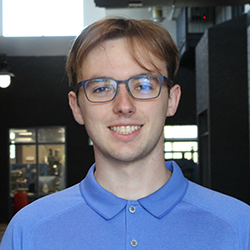
University of Prince Edward Island
Sustainable Design Engineering
Brian MacDonald has held many leadership roles related to his love for engineering and community. Through his work, Brian has demonstrated his dedication to ensuring student and program success. Under Brian’s leadership as Vice President, External, University of Prince Edward Island recorded the highest number of delegates at the national Canadian Engineering Competition, a boost in student participation. Brian also spearheaded a funding campaign that enabled all AEC winners to participate in the national competition.
Brian’s passion for student success is driven by his love for tutoring and teaching. Through a current project to create a coding club for elementary school children in Charlottetown, Prince Edward Island, Brian wants to continue to share his knowledge for engineering by teaching children and young adults. Brian is already on the right path to pursuing his goal to becoming an engineering professor.
Jayden Mackenzie

Bachelor of Chemical Engineering
Dalhousie University
Jayden Mackenzie’s work exudes superpower leadership. Previously the Small School Engagement Commissioner for the Atlantic Council of Engineering Students (ACES), Jayden helped chair the first in-person ACES conference post-pandemic to great success. Although, during the planning of the conference Jayden experienced some obstacles with committee member resignations and Nova Scotia’s massive hurricane. Jayden pushed through these challenges, planning the entirety of the conference on his own and creating unique engineering-based social and education activities.
With this wealth of knowledge and experience under his belt and as VP of External Engagement (VPX) for the Dalhousie Sexton Campus Society, Jayden helped other VPXs build confidence in their role and learn how to fully advocate for their fellow students. Jayden wants to continue this thread of great leadership by further promoting the profession to underrepresented groups and young people who may not know how diverse of a field engineering is.
Alexis Paredes
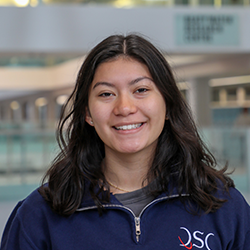
Bachelor of Applied Science in Mechanical Engineering
Queen’s University
Alexis Paredes has a diverse portfolio of experience from engineering initiatives to working with the Canadian Armed Forces. Within the engineering community, Alexis has demonstrated her leadership skills in roles such as Engineering Orientation Executive Committee Logistics Coordinator for Queen’s University, a Better Education Donation Fund Representative for Mechanical and Materials Engineering, and an Engineering Mental Health Steward. This is just a sample of Alexis’ involvement within the community where they have made a lasting impact.
As a Canadian Armed Forces (CAF) Primary Reservist serving as an Armoured Cavalry Soldier, Alexis has found an interest in different machinery used in the CAF. This has sparked her interest in becoming a Combat Systems Engineer to work on the ergonomics and efficiency of commonly used equipment in the CAF including vehicles, weapons, and clothing. Alexis is currently focussed on transferable engineering skills and analysis tools that will aid in the optimization of these systems, and brainstorming ways to implement them before entering the industry. The goal of this undertaking is to optimize tools that Canadian soldiers use in international and domestic operations such as peacekeeping, support personnel, and disaster relief.
Farah Sadek
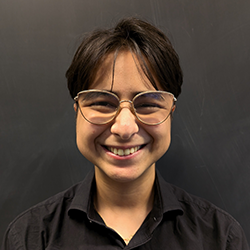
University of British Columbia
Bachelor of Chemical Engineering
As an engineering student actively involved in advocacy work for students with disabilities, Farah Sadek challenges the traditional boundaries of engineering by advocating for inclusivity and accessibility. As someone with a visual impairment, Farah has led initiatives focussed on making engineering spaces more accessible. On campus, Farah launched a mentorship program that pairs undergraduate and graduate students with disabilities to support them in navigating academics, student life, graduate studies, and wellness. Farah also started the Center for Accessibility campaign, advocating for improvements in the Center for Accessibility at the University of British Columbia, to confront systemic challenges impacting all disabled student.
As a future Chemical Engineer, Farah would like to build a career founded on understanding materials research and tackle issues on a systemic level. More specifically, developing bio-inspired materials that will improve infrastructural systems and reduce the consumption of natural resources.
Joyce Xi
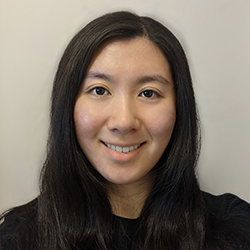
University of British Columbia
Biomedical engineering
Engineering design teams provide students with an opportunity to boost their creativity, connect with peers, and build their engineering skills. In addition to these benefits, University of British Columbia’s (UBC) Bionics engineering design team helped Joyce Xi enhance her leadership abilities. With Joyce’s experience as part of this team, she is creating high school workshops in collaboration with UBC Engineering, guiding students through developing a simplified version of their bionic arm prototype.
Through Bionics, Joyce also advocates for UBC-wide attitude change surrounding people with disabilities. Recognizing a need for improved knowledge on amputee participants, Joyce established regular team meetings with local disability foundation and prosthetics clinics to foster understanding of amputees as stakeholders who bring important perspectives to biomedical engineering solutions. In the long-term, Joyce would like to use her experience with equity, diversity, and inclusion initiatives to raise awareness about the lack of research pertaining to biological sex differences in biomedical engineering.
Ruth Yu
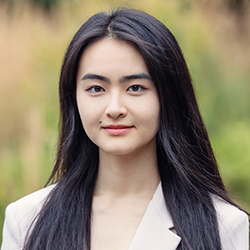
University of British Columbia
Biomedical Engineering
Ruth Yu strives to make engineering education accessible to all in the same way her high school chemistry teacher did. Ruth developed an interest in engineering through her very first exposure and wants to create more opportunities to gain practical experience for other students. This goal is already in motion through her participation with UBC Geering Up, leading elementary programs for grades 2-7 to explore engineering, and with Engineers without Borders, hosting high school case competitions and mentorship programs.
As a biomedical engineering student, Ruth’s long-term goal is to create more user-centric and data-driven methods of diagnosing and profiling cancer. Post-graduation, Ruth plans to pursue a master’s degree in bioengineering with a focus on molecular methods development. Ruth’s diversity of experience has helped her hone problem-solving and critical thinking skills, which are the same skills she hopes to equip students with to empower them in their learning journeys.


